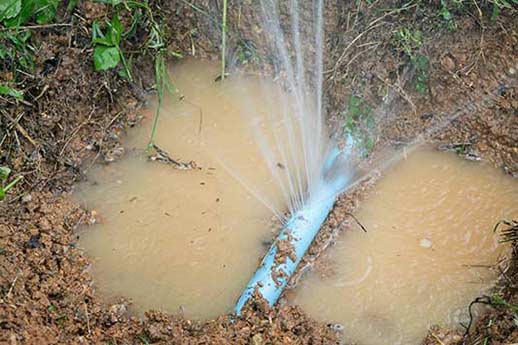
Your home’s main water line – the pipe that carries water from the public supply to your home – is easily the most critical part of your home’s plumbing system. This pipeline keeps your home adequately supplied with fresh, clean water, enabling you to keep your house hygienic.
But your water line can also be the biggest threat to the structural integrity of your house and the health of the people who live in your home according to Markham Services. That is because most disasters happening in homes are from undetected problems in the water line.
Your main water line is underground. As with pipes that are buried in the ground, the line is mostly unseen and often neglected. Problems such as cracks and leaks which would be easily visible if the pipe was above ground, can go undetected for a very long time.
The consequence is that when these problems are eventually discovered, they have caused major damage to the home and its inhabitants. Examples of water line problems that can create scenarios are listed below.
Common water line problems and their causes
The two main problems you may have in your water line are leaks and contamination. These two problems may happen as a result of the following reasons:
Corrosion
Corrosion is a huge problem in underground pipes, especially if the pipes are metal. A corroded pipe will weaken over time and become prone to leaks. Soil can enter the pipe via those leaks, contaminating the water inside.
Freezing
Pipes which are exposed to freezing temperatures are likely to burst as the water inside freezes and swells. Even when the water pipe can withstand this pressure, it may later crack as temperatures fall and the pipe materials contract.
Soil movements
If the soil around or beneath a home moves – due to not being properly compacted or because of seismic forces – the pipes in that soil can change their positions. That often leads to fractures and weakened connections.

Clogs
Even though it transports only fresh water, the main water line can still clog. A water line will clog if there is a lot of rust and soil particles inside it, perhaps due to corrosion within the pipe or soil infiltrating the water in the pipe.
Human error
If the water line is not properly installed, it will experience problems from the outset. Also, pressure changes and soil vibrations by construction works and landscaping activities can damage a well-installed water line.
Home disasters linked to a damaged water line
If these problems are undetected, the issues in the water line can eventually lead to a disaster in your home. Four of the most common catastrophes that can happen as a result of a broken main water line are:
Structural damage
A burst water main pipe may release enough water into the soil to undermine the foundation of your building. The soil beneath the house can become unstable due to a pipe leak. That will cause the foundation to show signs of failure.
Electrical damage
Moisture from a damaged water line can cause electrical problems in your home if water from a broken pipe bridges the home’s electrical circuits. That is a potentially life-threatening problem that can lead to electric shocks and house fires.
Sewage backup
A broken water line may dump enough water into your sewer line to overwhelm your home’s drainage system. The aftermath of such an event would often be that the trapped sewage in the sewer line will flow backwards into your home.

Contaminated water
A broken water line will admit disease-causing germs into the water supply. Heavy metals from the surrounding soil can also leach into the water. A damaged sewer line in the vicinity or heavy rainfall in the area can also lead to sewage entering your water supply.
Key water line maintenance tips
To ensure the integrity of your water line and the safety of your home and family, it is essential to acquaint yourself with the following signs of a broken water line:
- A sudden and large increase in your water bill without any major changes in your water usage.
- A noticeable drop in water pressure across the entire home, not just with a single fixture.
- A hissing or rumbling sound even when water is not being drawn from the supply pipe.
- Reddish or brown stains water stains in sinks, indicating rust or soil infiltration into pipes.
- A wet patch of soil outside the home or a section of lawn grass that is excessively green.
To conclude, the best way to avoid all the problems discussed above is to have your home’s plumbing – including the water line – routinely inspected by a professional plumber once a year. This simple step will keep you ahead of issues and avoid repairs on your main water line and save you a ton of trouble.

